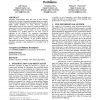Free Online Productivity Tools
i2Speak
i2Symbol
i2OCR
iTex2Img
iWeb2Print
iWeb2Shot
i2Type
iPdf2Split
iPdf2Merge
i2Bopomofo
i2Arabic
i2Style
i2Image
i2PDF
iLatex2Rtf
Sci2ools
GECCO
2008
Springer
2008
Springer
How generative encodings fare on less regular problems
Generative representations allow the reuse of code and thus facilitate the evolution of repeated phenotypic themes or modules. It has been shown that generative representations perform well on highly regular problems. To date, however, generative representations have not been tested on irregular problems. It is unknown how fast their performance degrades as the regularity of the problem decreases. In this report, we test a generative representation on a problem where we can scale a type of regularity in the problem. The generative representation outperforms a direct encoding control when the regularity of the problem is high but degrades to, and then underperforms, the direct control as the regularity of the problem decreases. Importantly, this decrease is not linear. The boost provided by the generative encoding is only significant for very high levels of regularity. Categories and Subject Descriptors I.2.6 [Artificial Intelligence]: Connectionism and Neural Nets General Terms Experi...
Direct Encoding Control | GECCO 2008 | Generative Encoding | Generative Representation | Optimization |
Related Content
| Added | 09 Nov 2010 |
| Updated | 09 Nov 2010 |
| Type | Conference |
| Year | 2008 |
| Where | GECCO |
| Authors | Jeff Clune, Charles Ofria, Robert T. Pennock |
Comments (0)

